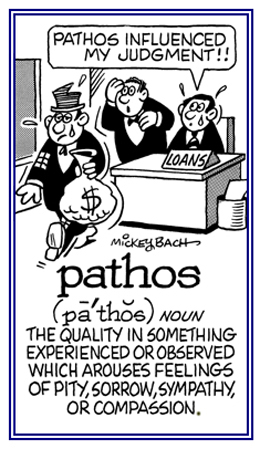path-, patho-, -path-, -pathia, -pathic, -pathology, -pathetic, -pathize, -pathy
(Greek: feeling, sensation, perception; suffering, disease, or disorder; a system of treating diseases)
In medicine, some of these elements usually mean "someone who suffers from a disease of, or one who treats a disease"; so, they should not be confused with the words that mean "feeling" which are also shown on these pages even though both meanings come from the same Greek element.
The transmission of a disease by insects, rodents, etc.: Jane was interested in pathophoresis and decided to study the effects of illnesses that had been transferred from certain bugs or gnawers to people.
The instance of a disease being conveyed: Pathophoria can be described as a transmitted infect to a person by an insect or other organism.
pathophoric (adjective), more pathophoric, most pathophoric
Regarding something that transmits a disease: There are certain kinds of mosquitos that are pathophoric in that they carry and pass on morbid conditions to people.
pathophorous (adjective), more pathophorous, most pathophorous
Concerning something that can cause an ailment: pathogenic: Because Mrs. Smith was so afraid of getting sick, she always cleaned her home every day, including washing all the windows and doors, in order to keep out all the pathophorous bugs and germs that might infect her.
The physiological process connected with a disease, an injury, or a disordered function: Pathophysiology is the research of developments of ailments, including the disturbance of a function that a disease causes in an organ, as distinct from any changes in structure that might be caused.
Pathophysiology is also concerned with a deranged function in an individual or an organ that is due to a disease.
pathoplastic (adjective), more pathoplastic, most pathoplastic
Descriptive of something that shows or exhibits the form of a disease: The pathoplastic and apparent symptoms of the structure and content of an illness is formed by a patient's past life.
pathoplastically (adverb), more pathoplastically, most pathoplastically
Regarding how something exhibits the variabilities in a disease that are formed by a patient's life: Mrs. Smith was told by her doctor that the illness she had was pathoplastically shaped by the occurrences and circumstances in her life.
A tendency to magnify the importance of one's disease: Because of her eye illness Jane couldn't see properly anymore, and used this as an excuse to have her husband read the newspaper out loud to her, although she could read the online version very easily herself. This method that Jane used is termed pathopleiosis.
1. A speech, figure of speech, or rhetorical device aimed to stimulate the passions: When Mary spoke to her audience in the town hall, she used the method of pathopoeia and put in all of her feelings in order to convince her listeners that she was the best candidate in the next election.
2. The excitation of passion by rhetoric, poetry, or music: At the concert, all of the audience fell into absolute silence as the passages played by the soloist put them into a trance of pathopoeia in which some of the listeners even started to cry because it was so beautiful and moving.
2. The excitation of passion by rhetoric, poetry, or music: At the concert, all of the audience fell into absolute silence as the passages played by the soloist put them into a trance of pathopoeia in which some of the listeners even started to cry because it was so beautiful and moving.
The causation of disease; pathogenesis: When working overtime and not getting enough sleep, Kitty suffered from pathopoiesis and had a strong tendency to become ill, especially on the weekends.
The psychology of mental illnesses: Jack was interested in the mental ailments of people which were caused by infections and other disorders, so he decided to specialize in pathopsychology.
A psychosis originating from an organic illness: A pathopsychosis involves bodily functions such as those arising from brain tumors or encephalitis.
A quality that arouses feelings of grief, sympathy, tenderness, or sorrow: Pathos and compassion have in common the idea of tender emotion that is caused by suffering or distress.

© ALL rights are reserved.
Go to this Word A Day Revisited Index
Pathos is a quality, as in literature and art, that arouses feelings of despondency or hopelessness.

Go to this Word A Day Revisited Index
so you can see more of Mickey Bach's cartoons.
An outdated term for any kind of diseased condition: Judy found out that pathosis referred to an infected condition, to one of many kinds of diseases, or diseased entity.
The tendency of drugs to pass into diseased areas: In her biology class in college, Ruth learned that pathotropism concerned certain disease structures that attracted drugs.


